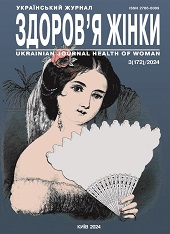Determination of the psychological profile of pregnant women who wish to choose an alternative childbirth option
DOI:
https://doi.org/10.15574/HW.2024.172.49Keywords:
alternative childbirth methods, pregnancy, childbirth experience, water birth, psychological profileAbstract
One of the main indicators of the country's development is the health of women and children. Today in Ukraine, there is a significant decrease in the level of physical and moral health among young people, which negatively affects the course of pregnancy and childbirth. At the same time, the term “childbirth experience” is spreading in the obstetric community, which reflects the peculiarities of a woman's own feeling of the process of giving birth to a child, along with the spread of “non-traditional” methods of childbirth, such as vertical childbirth, childbirth in the knee-elbow position, childbirth in water, which aimed precisely at obtaining a positive birth experience. However, in the literature reviewed by us, we found only isolated information about the criteria for selecting patients to be involved in the attempt of alternative birth options.
Aim - determine the psychological profile of pregnant women who wish to choose an alternative option for childbirth.
Materials and methods. Surveyed 274 pregnant women at 11-12 and 36-37 weeks of pregnancy using a Google form containing 16 questions to determine the psycho-emotional state, mood, plans and fears about future childbirth.
Results. The obtained results at 11-12 weeks outlined the psychological profile of pregnant women as a state of pleasure combined with insufficient knowledge about the course of childbirth. The results of the questionnaire at 36-37 weeks show a change in the psychological state in the direction of the development of fatigue with a significant increase in the number of women who are worried about the course of the upcoming childbirth, the pain associated with it, and want to involve close relatives/husband or an outside helper in childbirth. The majority of women have been found to have fear and uncertainty about their own condition during and after childbirth, which is the basis for an in-depth study of the psycho-emotional sphere. It was found that significantly more women want to try an alternative method of childbirth - water birth - 122 (44.5%).
Conclusions. The psychological profile of pregnant women who wish to choose an alternative method of childbirth, including water birth, is characterized by a feeling of fear and anxiety before the upcoming birth, fears about the use of pharmacological methods of analgesia, as well as about possible aggression on the part of medical stuff.
No conflict of interests was declared by the authors.
References
Bodin M, Holmström C, Plantin L, Schmidt L, Ziebe S, Elmerstig E. (2021, May 14). Preconditions to parenthood: changes over time and generations. Reprod Biomed Soc Online. 13: 14-23. https://doi.org/10.1016/j.rbms.2021.03.003; PMid:34136667 PMCid:PMC8178081
Center for Medical Statistics of the Ministry of Health of Ukraine. (2022). Zvіt pro medichnu dopomogu vagіtnim, rodіlljam ta porodіlljam za 2022 rіk. URL: http://medstat.gov.ua/im/upload/F21_R0_2022.xls.
Gani I, Irfat A, Mohd AD. (2023). Reproductive Health of Women: a comprehensive review. International Journal of Current Research in Physiology and Pharmacology (IJCRPP). 7. 11-25.
Ghanbari-Homaie S, Meedya S, Mohammad-Alizadeh-Charandabi S et al. (2021). Recommendations for improving primiparous women's childbirth experience: results from a multiphase study in Iran. Reprod Health. 18: 146. https://doi.org/10.1186/s12978-021-01196-7; PMid:34229710 PMCid:PMC8259137
Mills TA, Roberts SA, Camacho E., Heazell AE, Massey RN, Melvin C. (2022). Better maternity care pathways in pregnancies after stillbirth or neonatal death: a feasibility study. BMC Pregnancy and Childbirth. 22(1): 1-14. https://doi.org/10.1186/s12884-022-04925-3; PMid:35948884 PMCid:PMC9363262
Nove A, Ten Hoope-Bender P, Boyce M, Bar-Zeev S, de Bernis L, Lal G et al. (2021, Nov 27). The State of the World's Midwifery 2021 report: findings to drive global policy and practice. Hum Resour Health. 19(1): 146. https://doi.org/10.1186/s12960-021-00694-w; PMid:34838039 PMCid:PMC8627087
Vargas-Rubilar J, Richaud MC, Balabanian C, Lemos V. (2023, Jul 27). Parenting, Gender, and Perception of Changes in Children's Behavior during the COVID-19 Pandemic. Int J Environ Res Public Health. 20(15): 6452. https://doi.org/10.3390/ijerph20156452; PMid:37568994 PMCid:PMC10419007
Vinnars MT, Bixo M, Damdimopoulou P. (2023, Dec 1). Pregnancy-related maternal physiological adaptations and fetal chemical exposure. Mol Cell Endocrinol. 578: 112064. Epub 2023 Sep 6. https://doi.org/10.1016/j.mce.2023.112064; PMid:37683908
WHO. (2016). WHO recommendations on antenatal care for a positive pregnancy experience. Geneva: WHO: 152.
World Health Organization. (2017). Global Strategy for Women's, Children's and Adolescents' Health (2016-2030) data portal. Geneva: World Health Organization. URL: https://www.who.int/publications/i/item/WHO-UHL-MCA-GS-23.01.
World Health Organization. (2018). WHO recommendations on intrapartum care for a positive childbirth experience. World Health Organization. URL: https://books.google.pl/books?hl=uk&lr=&id=hHOyDwAAQBAJ&oi=fnd&pg=PR5&dq=who+intrapartum+care&ots=edEmVfHxPc&sig=9ltmHhsPg5ije6grUR5c1hme3O8&redir_esc=y#v=onepage&q=who%20intrapartum%20care&f=false
Zhylka NIa, Clabkyy̆ HO, Shcherbinska OS (2021). Stan reproduktyvnoho zdorov'ia zhinok v Ukraïni. Ohliad literatury. Reproduktyvna endokrynolohiia. 4(60): 65-69. ISSN 2309-4117
Zhylka NIa, Myroniuk IS, Slabkyi HO. (2018). Kharakterystyka deiakykh pokaznykiv reproduktyvnoho zdorov'ia zhinochoho naselennia Ukrainy. Wiadomości Lekarskie. 71(9): 1803-1808.
Downloads
Published
Issue
Section
License
Copyright (c) 2024 Ukrainian Journal Health of Woman

This work is licensed under a Creative Commons Attribution-NonCommercial 4.0 International License.
The policy of the Journal UKRAINIAN JOURNAL «HEALTH OF WOMAN» is compatible with the vast majority of funders' of open access and self-archiving policies. The journal provides immediate open access route being convinced that everyone – not only scientists - can benefit from research results, and publishes articles exclusively under open access distribution, with a Creative Commons Attribution-Noncommercial 4.0 international license (СС BY-NC).
Authors transfer the copyright to the Journal UKRAINIAN JOURNAL «HEALTH OF WOMAN» when the manuscript is accepted for publication. Authors declare that this manuscript has not been published nor is under simultaneous consideration for publication elsewhere. After publication, the articles become freely available on-line to the public.
Readers have the right to use, distribute, and reproduce articles in any medium, provided the articles and the journal are properly cited.
The use of published materials for commercial purposes is strongly prohibited.

